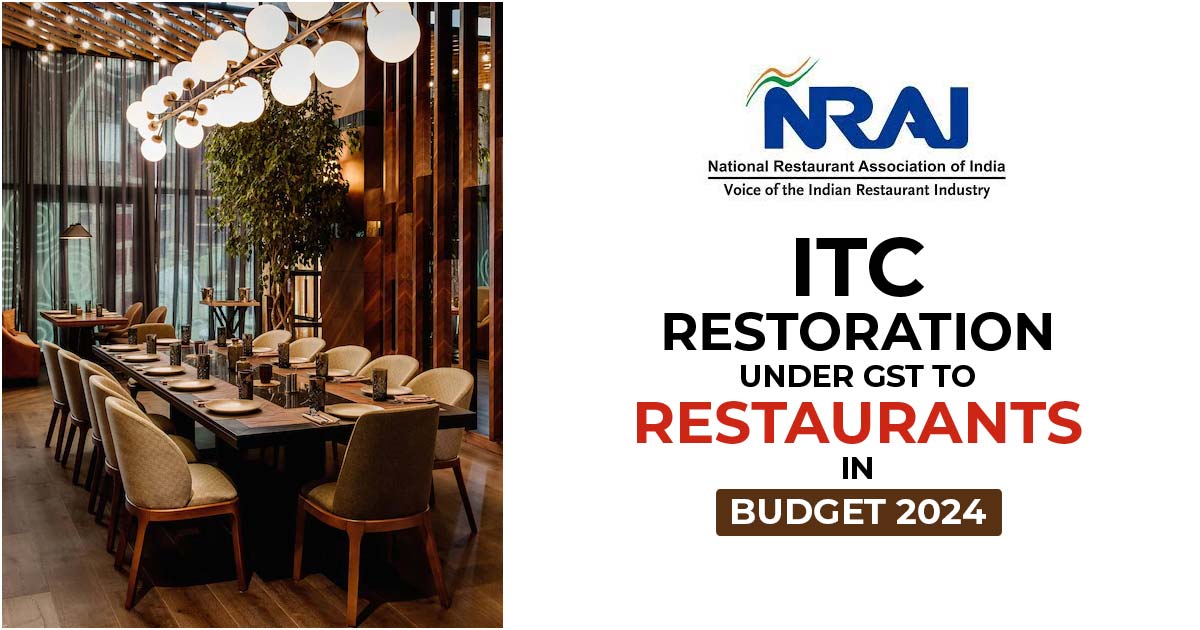
the National Restaurant Association of India appealed to the government to reinstate input tax credit for restaurants. Additionally, they recommended an increase in the GST rate existing 5% to 12% in anticipation of the upcoming Union Budget.
In a letter addressed to Finance Minister Nirmala Sitharaman, the National Restaurant Association of India emphasized the need for a fair and equitable e-commerce policy.
They stressed the importance of balanced policies and regulations to establish a level playing field, allowing platforms to innovate while safeguarding restaurants, delivery partners, and consumers from potentially exploitative practices.
Important: Many Restaurants in State Cheating Customers with Bogus GST Bills
The restaurant industry, severely impacted during the pandemic, has demonstrated remarkable resilience in its recovery. According to a statement from the NRAI, if the sector receives specific policy and budgetary support in the upcoming Budget, it will experience an accelerated growth trajectory.
The industry body is advocating for the restoration of GST input tax credit (ITC), emphasizing that it is the only sector subjected to a 5% GST without the benefit of ITC—an arrangement intended to prevent cascading taxation.
The absence of ITC not only diminishes the operating margin for businesses but also substantially increases the capital budget required for new projects.
The escalation in project costs hinders the progress of expansion plans, significantly affecting the overall growth of the sector, as mentioned.
The industry, in response, proposes the restoration of the Input Tax Credit (ITC) for restaurants along with a simultaneous increase in the GST rate to 12%, up from the GST current rate of 5%, according to the NRAI.
The statement recognizes that this adjustment might pose a compliance burden for smaller businesses. Therefore, the NRAI suggests implementing this change based on revenue slabs.
Restaurants falling below a specific revenue threshold could continue operating under the existing GST provisions, while the organized sector with higher revenues and capital expenditure might transition to the proposed GST regime.
Kabir Suri, the President of NRAI, highlighted the immense potential for growth in India’s food services industry. Not only does the sector play a crucial role in contributing to government revenue, but it also stands as one of the largest employers in the country.
Suri emphasized that government policies, including balanced and fair treatment in GST input tax credit, rationalized licensing norms, and a well-structured e-commerce policy, would not only benefit businesses and consumers but also significantly contribute to overall economic growth and employment opportunities.
Regarding an equitable e-commerce policy, NRAI expressed concerns that, despite offering convenience, online platforms have raised issues related to fair competition and balanced growth.
Recommended: Are Restaurants Charging Correct GST Bills? Know The Complete Details
The NRAI additionally requested the conferment of “industry status” upon the food services sector, citing its “significant contribution” to the nation’s economy.
The letter to the Finance Minister highlighted that this designation would result in numerous advantages under central or state industrial policies, such as streamlined access to finance, special schemes, subsidies, and expedited clearance processes. This move is expected to foster both enterprise and entrepreneurship.
Furthermore, the NRAI called for the rationalization of licenses and No Objection Certificates (NOCs), noting that, on average, a restaurant needs to obtain 15-25 licenses/NOCs for the commencement and operation of an outlet.
The presence of numerous licenses and permits poses a hindrance to the expansion of food businesses beyond their primary locations, leading to increased operational complexity and compliance burdens, as stated by the industry. The industry body further appealed to the finance minister for specialized subsidy programs and facilitated access to debt financing for Small and Medium Enterprises (SMEs).
This includes subsidies on essential ingredients, utilities, and waste management, aimed at alleviating operational costs for struggling restaurants, particularly in smaller towns and cities.
Additionally, the industry body urged the government to contemplate extending working hours for the restaurant sector and reducing the Goods and Services Tax (GST) on materials used for home delivery.








